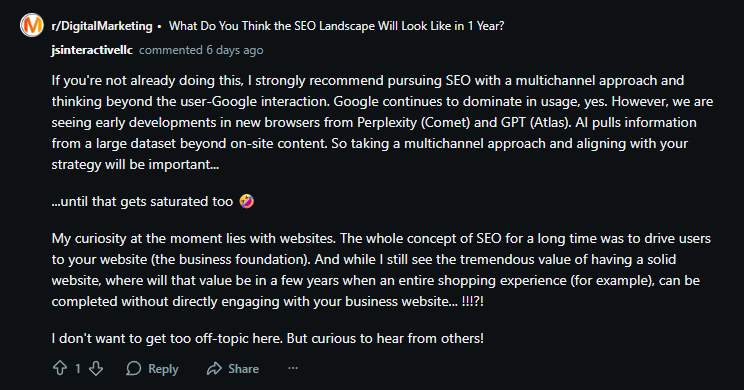4 Online Validation Channels to Strengthen Search Visibility and Build Trust

You search for “best standing desk for a home office.”
AI Overviews break it down, and Google gives you a list of results. But you don’t stop there.
You check Reddit for unbiased commentary and feedback on the product’s quality.
You skim YouTube for unboxings and reviews to ensure the product lives up to its claims.
You’re looking for proof, not just specs or summaries scraped from other sites.
The internet is crowded. Every product sounds like the best one. And while AI offers answers more quickly, it often makes people second-guess what they’re seeing.
Building trust with online users needs to extend beyond the top 10 SEO results. This is where online validation channels can help.
What Are Online Validation Channels?
Online validation channels are platforms consumers often visit after their initial search or touchpoint. They are community-driven spaces where users seek confirmation about a product or business before making further consideration.
Think social media comments, Quora threads, product review sites, and niche forums.
They’re not shaped by brands. They’re built on authentic experience.
As AI-generated answers become more common in search results, users are searching beyond AI summaries to validate businesses. They want input from people who have firsthand experience with a company or its product.
Why Validation Channels Matter for SEO Visibility
When people fact-check a search result, they often end up on forums, video comments, or review threads. This is the step where trust is built.
Search results now include entire sections dedicated to discussions and forums. These aren’t fillers. They’re treated as real signals of authority.
When a brand is mentioned, reviewed, or recommended in these spaces, it strengthens both visibility and credibility. In many cases, a thread with honest peer feedback can outrank a company’s own website because users trust the voice behind it.
The Trust Multiplier: What Human Validation Means For AI Search
Validation channels influence more than just people. They influence the AI systems that decide what surfaces in search results.
Studies show 54% of U.S. consumers trust online reviews more than any other source, including friends, influencers, and brands.
You can’t buy or fake this. It has to be earned in public, where trust is on display.
4 Online Validation Channels That Build Trust
To build trust and enhance visibility, it’s important to consider where your audience goes to seek and verify information. These four platforms are key validation points, offering a real opportunity for your brand to be noticed.
1. Reddit
Reddit is no longer just a forum. It is a research engine.
People use it to double-check what they find on Google, ask specific questions, and see how others have solved problems. For many, it is where trust is formed.
Nearly two-thirds of people in the U.S. use Reddit as a search engine at least once a week. And 41% of users say it is better than Google.
Businesses that succeed on this channel don’t market. They contribute.
Here’s how to do that in an authentic way that builds credibility:
- Identify relevant subreddits: Look for communities aligned with your product or expertise, such as r/SmallBusiness, r/Marketing, r/ITSupport, or niche industry threads
- Use a real account: Post from a human profile, not a faceless brand. Build karma through consistent engagement before offering any value tied to your business.
- Answer questions with experience: Jump into threads where your team can offer practical advice, insight, or perspective based on real client work
- Link sparingly and with context: If you have a blog post or tool that directly helps, include it only after offering a helpful, non-sales-focused answer
- Monitor sentiment: Reddit is brutally honest. Use conversations as a listening tool to understand what people think about your category or competitors.
Reddit not only builds trust but also boosts visibility. The platform appears in over 97% of product-review searches, and Google now includes a “Discussions and Forums” section on 77% of those result pages.

2. YouTube
YouTube is another great platform for consumers who are close to the end of their buyer journey. For example, they may want to watch someone using the product or explaining it before purchasing. Maybe the video breaks down the product in plain terms and shares hands-on experience.
For businesses, YouTube is an opportunity to teach. In 2024, 53% of Gen Z purchased after watching a review video. But it is not just Gen Z. People of all ages use YouTube to validate what they are about to buy or sign up for.
If you’re going to use this channel, here’s what works:
- Create explainer content: Focus on common questions, product comparisons, or “how to” walkthroughs relevant to your audience
- Use real people, not scripts: Showcase team members or customers explaining concepts in a conversational way
- Structure videos around search: Use clear titles and descriptions that match how users ask questions, like “Best standing desk for tall people” or “How to install X in under 10 minutes”
- Engage with comments: Answer follow-up questions, clarify details, and keep the conversation going.
- Repurpose content: Turn blog posts, FAQs, or sales conversations into quick videos that solve specific problems
3. Forums & Niche Communities
Forums may feel old-school, but they remain among the most trusted spaces on the internet. These are the places where professionals, hobbyists, and power users trade insights, troubleshoot problems, and vet products with zero filter.
Here is how to show up well:
- Find the right spaces: Look for forums that serve a specific professional or technical audience. For example, Local Search Forum is a trusted community where SEOs ask for help, compare tools, and share firsthand results.
- Add value to existing threads: Share personal knowledge, walk through a fix, or clarify a common question based on real experience.
- Be consistent, not promotional: Skip the sales pitch. People remember contributors who show up to help.
- Use it as a listening tool: Forums surface pain points, misconceptions, and unmet needs. This is content and product feedback at its rawest.
These spaces may not have massive reach, but they carry weight. And when your advice is useful, your name (and your brand) stays with the conversation.
4. Review Sites & Mentions
Before people trust a brand, they want to see what others have said about it. Reviews are often the last stop before a decision is made, and one of the strongest validation signals a business can earn.
Here’s how to build trust through reviews and mentions:
- Ask for honest feedback: Invite real customers to leave reviews on platforms like Google, G2, or industry-specific directories like Upwork and Clutch.
- Respond to everything: Thank people for positive reviews, and handle negative ones with clarity and professionalism.
- Track brand mentions: Keep an eye on where your name shows up, including blog posts, roundup articles, and discussion threads.
- Use feedback internally: Reviews are not just for marketing. They can reveal product gaps, customer friction points, or experience wins worth repeating.
In 2024, consumers read an average of 7 reviews before trusting a business, and 92% prefer businesses with at least a 4-star rating. When reviews come from real people, they carry weight.
This kind of credibility strengthens everything else you do.
Build Trust Where It Matters Most with JS Interactive
Online validation channels can be a crucial part of a buyer’s journey. These conversations shape credibility, whether you choose to participate or not.
Smart brands show up in the places where their consumers live, not with a pitch, but with something useful to say.
JS Interactive helps businesses earn trust in the spaces that matter. We focus on real visibility, grounded in human credibility, not just rankings.
Contact us today for your consultation.